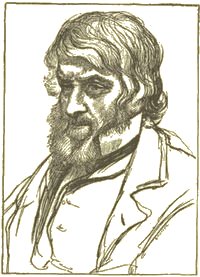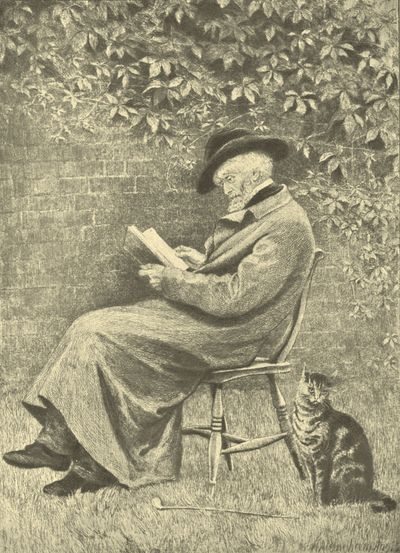Thomas Carlyle, born on December 4, 1795, in Ecclefechan, Scotland, was a prominent 19th-century historian, essayist, and social critic whose works profoundly influenced Victorian thought. Carlyle was the son of a stonemason and was educated at the University of Edinburgh, initially studying for the ministry before turning to a literary career.
 Carlyle's early works included translations of German literature, notably Goethe's Wilhelm Meister's Apprenticeship, which introduced German Romanticism to the English-speaking world. His own writings, characterized by a distinctive, intense style, combined history, biography, and philosophy. Carlyle's breakthrough work, Sartor Resartus (1833-1834), presented as a fictional philosopher's musings on the nature of society and the individual's place within it, gained him considerable acclaim.
Carlyle's early works included translations of German literature, notably Goethe's Wilhelm Meister's Apprenticeship, which introduced German Romanticism to the English-speaking world. His own writings, characterized by a distinctive, intense style, combined history, biography, and philosophy. Carlyle's breakthrough work, Sartor Resartus (1833-1834), presented as a fictional philosopher's musings on the nature of society and the individual's place within it, gained him considerable acclaim.
 His most significant historical work, The French Revolution: A History (1837), was both a vivid narrative of the events and a deep analysis of the moral and social upheavals they entailed. Carlyle's dramatic and personal style of historical writing made the book immensely popular and influential, emphasizing the importance of great individuals in shaping history.
His most significant historical work, The French Revolution: A History (1837), was both a vivid narrative of the events and a deep analysis of the moral and social upheavals they entailed. Carlyle's dramatic and personal style of historical writing made the book immensely popular and influential, emphasizing the importance of great individuals in shaping history.
Carlyle's belief in the power of heroic leadership was further elaborated in his lectures compiled as On Heroes, Hero-Worship, and The Heroic in History (1841), where he argued that history is shaped by the actions of great men, whom he saw as the drivers of progress.
Despite his literary success, Carlyle's later years were marked by personal tragedy and disillusionment. The death of his wife, Jane Welsh Carlyle, in 1866 deeply affected him. His later works, including The Latter-Day Pamphlets (1850), reflected a more pessimistic view of contemporary society and politics.
Carlyle's legacy is complex. He was a towering intellectual figure whose works inspired many, yet his views, particularly his sometimes authoritarian and reactionary stances, sparked controversy. Nevertheless, Thomas Carlyle's contributions to literature and historical thought remain significant, making him a key figure in the intellectual landscape of the 19th century.
This famous Scot claimed, "the history of the world is but the biography of great men." [On Heroes, Hero-worship, & the Heroic in History. New York: D. Appleton & Co. (1841), p. 34.]
|

 Carlyle's early works included translations of German literature, notably Goethe's Wilhelm Meister's Apprenticeship, which introduced German Romanticism to the English-speaking world. His own writings, characterized by a distinctive, intense style, combined history, biography, and philosophy. Carlyle's breakthrough work, Sartor Resartus (1833-1834), presented as a fictional philosopher's musings on the nature of society and the individual's place within it, gained him considerable acclaim.
Carlyle's early works included translations of German literature, notably Goethe's Wilhelm Meister's Apprenticeship, which introduced German Romanticism to the English-speaking world. His own writings, characterized by a distinctive, intense style, combined history, biography, and philosophy. Carlyle's breakthrough work, Sartor Resartus (1833-1834), presented as a fictional philosopher's musings on the nature of society and the individual's place within it, gained him considerable acclaim.  His most significant historical work, The French Revolution: A History (1837), was both a vivid narrative of the events and a deep analysis of the moral and social upheavals they entailed. Carlyle's dramatic and personal style of historical writing made the book immensely popular and influential, emphasizing the importance of great individuals in shaping history.
His most significant historical work, The French Revolution: A History (1837), was both a vivid narrative of the events and a deep analysis of the moral and social upheavals they entailed. Carlyle's dramatic and personal style of historical writing made the book immensely popular and influential, emphasizing the importance of great individuals in shaping history. 







